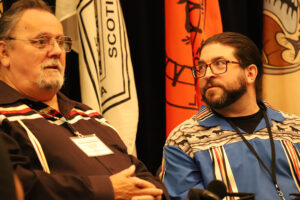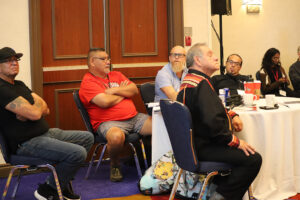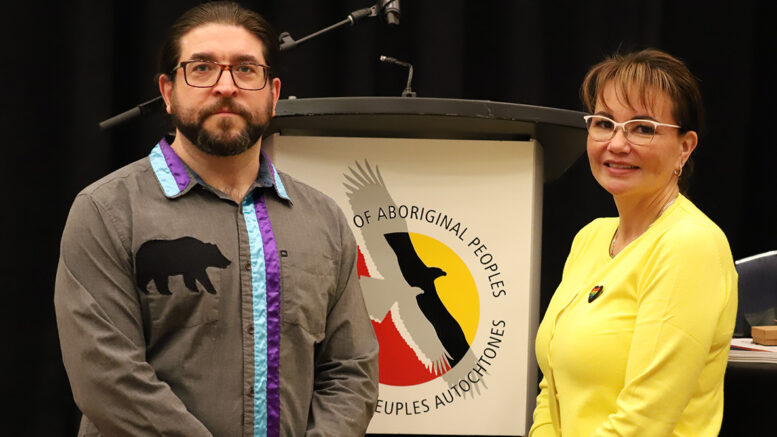By Terry Lusty, Local Journalism Initiative Reporter
(ANNews) – Ottawa was a beehive of activity recently as delegates from across Canada converged on the city’s Marriott Hotel for the 53rd anniversary of the Congress of Aboriginal Peoples (CAP).
This particular year, 2024, was a more emotional one for many delegates in that an election was taking place for the two senior-most executive positions – the National Chief and the Vice-Chief. Once the counting was concluded and the dust settled, the New Brunswick candidate, Brendan Moore, was declared the new National Chief.
Moore, of Mi’kma’ki and Scottish heritage, has a past record of 14 years involvement with the New Brunswick Aboriginal Peoples Council and was strongly endorsed by that body in his quest for the national chieftanship. He possesses a strong athletic background and is a man who walked the Red Road to arrive at the point he has in his life.

Outgoing CAP National Chief Elmer St. Pierre with newly elected National Chief Brendan Moore. Photo by Terry Lusty
The race for the position of National Vice-Chief was highly contested with five delegates in the running. After the first round of balloting, three of the five were caught up in a real nail-biter as they were deadlocked in a three-way tie. After round two of balloting, however, it was an exuberant Shawna Jean from Alberta who prevailed as the new Vice-Chief.
Jean is a dedicated hockey mom, a business supporter and community supporter. She and her husband, Dwayne, are the proud parents of four children in northern Alberta.
When not performing Indigenous Congress of Alberta Association (ICAA) business, she may be found at a board or committee meeting, doing research, volunteering, jingle dancing, or giving back to her community in one way or another. In short, she keeps extremely busy, lives her Cree culture and serves her community well in more ways than one. That kind of commitment will serve CAP very well down the road.

Some of the Alberta delegates at the AGM for the Congress of Aboriginal Peoples held in Ottawa last month. Photo by Terry Lusty
One day earlier, Sept. 19, a special forum on Indigenous people with disabilities was the focus of attention. The 11 a.m. to 2:00 p.m. presentation began with an opening prayer by Maritimer Georgina Knockwood (a.k.a. Red Fox Woman) and remarks from the National Chief, Elmer St. Pierre. Tied into the session was the opportunity to review differing ideas, concepts, understanding and views regarding the widespread need for programs that accomodate and advocate for those with challenging conditions. Special guest speaker Dr. Lynn Gehl from Toronto delivered an address on the subject. She is an ardent advocate for Indigenous rights including for those with disabilities. A follow-up round table addressed such matters as needs, barriers, treatments, shortfalls and prospects of developing not only recommendations, but potential solutions and improvements.
At the Sept. 20 start of CAP’s Annual General Assembly (AGA), a land recognition of Algonquin Territory was offered. This was followed by a number of annual reports and St. Pierre’s acknowledgement of the commitment of the Elder and Youth Council that lends attention to community wellness and the Sixties Scoop.
Additional funding plus expansion of child welfare are of concern he added as is the lack of support for land rights which he deems as “counter productive” to what CAP’s been fighting for and, thus, “entrenches old colonial approaches rather than advancing reconciliation.” He additionally blasted the feds for neglecting capacity development and funding, and not adequately dealing with the CAP – Daniels decision which he says is “minimal.”
St. Pierre further criticized the United Nation’s (UN) work in human rights as an “exercise in futility” with regards to the Native community, as well as being shut out from a seat to deal with other matters, including reconciliation.
Outgoing vice-chief Kim Beaudin, reported on concerns related to Indigenous identity, political advocacy and MMIWG&2S awareness. Funding and aiding the urban Indigenous population are always an issue he added, as are corrections, civil liberties, justice, wellness, and more.
Other brief reports came from the Elders Council with particular mention of housing, justice, youth-Elder relations, communications, correctional services and a variety of events, occurrences and engagements. CAP also presented reports on finances, CEO workings, special resolutions and bylaw recommendations.
The organization hosted its dinner and gala on Friday evening, Sept. 20 in the Victoria Ballroom of the Marriott Hotel.
Towards the conclusion of the banquet dinner and gala, the Congress paid homage to two delegates by presenting them with an Aboriginal Order of Canada for their inspiring careers and dedicated efforts at the community level. The youth category was bestowed upon British Columbia’s Rainbow Eyes (a.k.a. Angela Davidson); the adult category to (yours truly), Alberta’s Dr. Terry Lusty.
In her nomination of Dr. Lusty, Shawna Jean praised his longevity in helping and contributing to the Native community in several ways. He is, she stated, “well known as an Elder, activist, historian, author, poet and journalist” who has been recognized with an Honourary Doctor of Laws and “continues to contribute to our community through sitting on boards, supporting Indigenous initiatives and sharing photos and stories of our Indigenous history.”
The youth recipient, Rainbow Eyes, is known for being a key defender of old growth forests over the past four years in the Fairy Creek region of B.C. She initially got her inspiration while attending the Vancouver Island University First Nations Stewardship Technical Training Program and has worked diligently, helping to protect water, wildlife, lands, trees and cultural values for the coming generations. Her earlier involvements in Calgary consisted of helping cancer survivors, following her own battles with the illness. She is also known for her role with the Green Party and as a spokesperson in the arena of lessening resource depletion and climate change.
Both recipients, Terry Lusty and Rainbow Eyes, were honoured with standing ovations.
The CAP banquet and gala evening concluded on a high note as delegates mingled, visited and kicked up their heels on the dance floor and some even participated in karaoke singing.
Giving the final word to the newly-elected National Chief of CAP, Moore later shared the following message as a priority concern: “We’re going to have to start building relationships and getting known and start meeting with various Indigenous organizations and communities. Start to build trust at that level and have people understand we’re working on these things as well and have them understand [our] perspectives on it so we can come together and be more unified.”



wonderful news!
This is great news a fresh start for the new leadership, we must also recognize the hard work of the folks moving on , this is an invisible organization many indigenous folks don’t even no it exists, who do we contact how do we get ahold of our local representative, do we have one ???